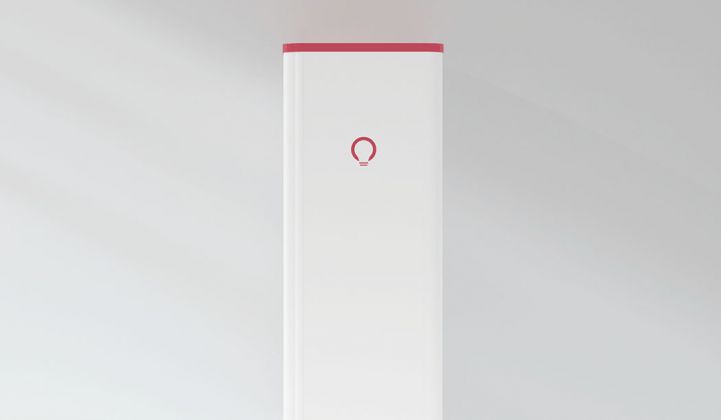A startup hopes to crack Germany’s residential energy storage market with a flow battery, despite problems for the technology elsewhere.
VoltStorage, of Olching, Bavaria, is commercializing Europe’s first redox flow battery for home use in a move that echoes Redflow’s brief excursion into the residential market in Australia.
The VoltStorage Series 100 battery, with 3.6 kilowatts and 6.8 kilowatt-hours of capacity, was being offered at a preorder price of €5,999 (about USD $7,060). It is not clear if this price includes installation costs and sales tax.
For comparison, the 4.6-kilowatt, 13.5-kilowatt-hour lithium-ion Tesla Powerwall sells for €7,350 ($8,650) in Germany, including supporting hardware and 19 percent sales tax, with installation costing up to a further €3,300 ($3,890).
Assuming the VoltStorage price excludes installation but includes sales tax, buying the flow battery will cost more than a third more per installed kilowatt-hour of capacity than the Powerwall.
But VoltStorage does not seem worried about competing on price. Instead, on its website the firm claims its 220-liter, made-in-Germany vanadium redox flow battery is the safest and cleanest home energy storage solution on the market.
“The vanadium electrolyte used as a storage medium consists of 80 percent water,” it states. “Thus, the risk of catching fire is 100 percent eliminated.”
VoltStorage touts vanadium’s environmentally friendly credentials compared to other battery chemistries, citing the toxicity of lead in lead-acid batteries and concerns about the environmental and social impact of lithium extraction for lithium-ion cells.
As well as catering for safety- and environmentally conscious buyers, VoltStorage could also claim an economic advantage on the basis of a longer battery lifespan. The Tesla Powerwall is generally considered to have a useful lifespan of up to around 3,200 cycles.
According to VoltStorage, its batteries could go through more than 10,000 cycles with no degradation.
Based on a full charge and discharge in each cycle, which is admittedly unlikely, the Powerwall could deliver 43,200 kilowatt-hours over its lifetime, at a cost of €0.17 ($0.20) per kilowatt-hour (ignoring installation costs and the price of energy used for charging).
With its significantly higher cycling capacity, though, the VoltStorage battery could over time deliver 68,000 kilowatt-hours, bringing the per-kilowatt-hour cost down to €0.09 ($0.11).
VoltStorage has factored its battery’s longer lifespan into an online calculator that shows, for example, how a German household could save €7,500 ($8,850) in utility bills over 15 years with a flow battery attached to a 3.9-kilowatt solar array.
But the company only offers a 10-year warranty, which is the same as Tesla’s. And to date, no one has been able to compete with lithium-ion batteries in the residential market.
In Australia, Redflow tried to entice homeowners to buy its 5-kilowatt, 10-kilowatt-hour zinc-bromine flow batteries. But it backed off the market in the face of sluggish sales.
VSUN Energy last year also unveiled plans to target the Australian residential market with a flow battery, but it's unclear if the company has gained traction.
Brett Simon, senior energy storage analyst at GTM Research, said selling flow batteries into the German residential market could be a tall order.
“A consistent story I hear from flow battery folks, regardless of segment focus, is that their products are superior to Li-ion from both a safety and a cycle-life perspective,” he said. “VoltStorage could be hoping to capitalize on customers who want a product they perceive to be safer and can last longer.”
The problem with the lifespan calculation, though, is that lithium-ion battery prices are dropping so fast that it might make economic sense to switch to a newer, better model within 10 years.
Furthermore, said Simon, Germany has the most highly developed residential energy storage market in the world. “My sense is that new players will face an uphill battle,” he said
“Brands like sonnen and LG Chem are already well known and trusted, and if VoltStorage wants to succeed, it will need to offer a superior product on multiple fronts. I'd argue that Germany will be tougher than Australia.”




